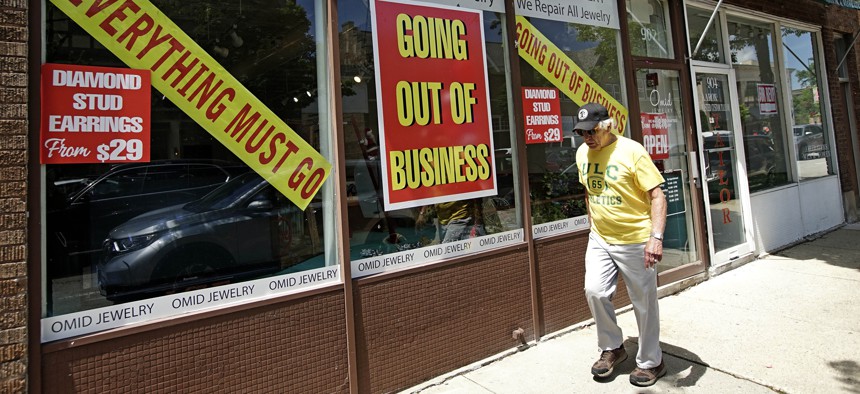The Fight Continues Over Paying Enhanced Jobless Benefits Beyond July

A man walks past a retail store that is going out of business due to the coronavirus pandemic in Winnetka, Ill. on June 23, 2020. AP Photo

Connecting state and local government leaders
Senate Democrats introduced legislation that would extend the $600-per-week unemployment supplement, but Republicans say the size of the extra payment discourages people from returning to work.
The federal government’s $600-per-week payments to unemployed workers are set to stop at the end of July.
But as coronavirus infection rates spike and some states are beginning to reinstate business closures, Democrats in Congress on Wednesday proposed continuing the expanded benefits while unemployment rates remain high.
Under the legislation, the $600-a-week payments that are made in addition to states’ varying weekly benefits would continue until jobless rates in individual states fell below 11%. Payments would then drop by $100 for every percentage point decrease in a state’s unemployment rate until it reaches 6%.
“In the face of exploding outbreaks and unprecedented economic pain, it would be unconscionable to allow supercharged unemployment benefits to expire in a month,” said Sen. Ron Wyden, the ranking member on the Senate Committee on Finance.
He said the extra benefits should be tied to the specific economic conditions people are experiencing.
More than 47.3 million unemployment applications have been filed since March, meanwhile the national unemployment rate hit 13% in May, according to the Bureau of Labor Statistics. In the past couple weeks, the number of people reported as filing initial claims for benefits leveled off at about 1.5 million.
Republicans in the Senate have said they will not support a continuation of the $600-per-week unemployment payments, voicing concern that the enhanced benefits have dissuaded some people from returning to work because they would make less money. But Senate Majority Leader Mitch McConnell has indicated that aid for laid off workers should continue amid the coronavirus pandemic, though it is unclear to what end he may be willing to negotiate with Democrats.
"Unemployment is extremely important. And we need to make sure, for those who are not able to recover their jobs, unemployment is adequate," McConnell told reporters this week. "That is a different issue from whether we ought to pay people a bonus not to go back to work. So, I think that was a mistake."
But having the basic protection of unemployment insurance “is extremely important and should be continued,” he said.
The maximum amount that states pay in unemployment insurance varies widely, from $823 a week in Massachusetts to $235 a week in Mississippi, with the average weekly benefit nationwide equating to about $385 a week.
“The basic unemployment benefit that is out there for individuals is low,” said Andrew Stettner, a senior fellow and expert on unemployment insurance at The Century Foundation.
He estimates that about 26 million people are receiving the enhanced $600-per-week benefit, with the federal government paying out about $15.6 billion per week. The debate over whether to extend the enhanced benefits is “the most important single policy that is up in the air right now,” Stettner said.
“Given the number of people still out of work, moving away from that could really have disastrous impacts on the economy,” he said.
In addition to continuing the expanded unemployment benefits, the Democrats’ legislation would also extend the period of time that laid-off workers could access benefits. The CARES Act provides 13 additional weeks of benefits to out-of-work Americans who exhaust their state and federal unemployment benefits. Currently the cut off for those extended benefits is the end of December, but the latest proposal would enable people to continue collecting those payments through the end of March 2021.
Andrea Noble is a staff correspondent with Route Fifty.

NEXT STORY: Hollowed-Out Public Health System Faces More Cuts Amid Virus




